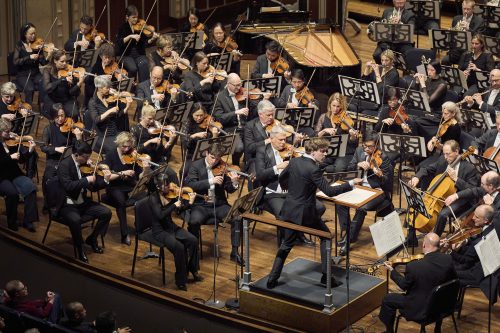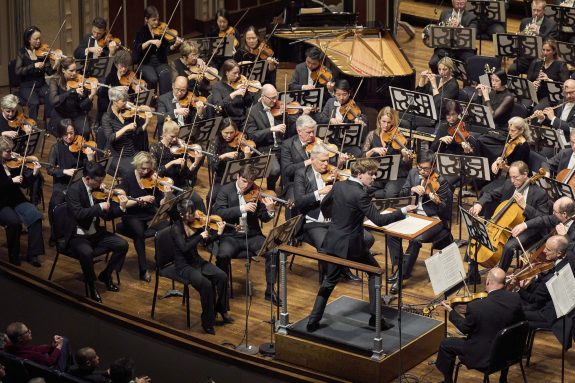 United States López Ballido, Elgar, Walton: Sol Gabetta (cello), Thomas Hampson (baritone), Cleveland Orchestra Chorus (chorus director: Lisa Wong), Cleveland Orchestra / Klaus Mäkelä (conductor). Mandel Concert Hall at Severance Music Center, Cleveland, 13.4.2024. (MSJ)
United States López Ballido, Elgar, Walton: Sol Gabetta (cello), Thomas Hampson (baritone), Cleveland Orchestra Chorus (chorus director: Lisa Wong), Cleveland Orchestra / Klaus Mäkelä (conductor). Mandel Concert Hall at Severance Music Center, Cleveland, 13.4.2024. (MSJ)

Jimmy López Ballido – Perú negro
Elgar – Cello Concerto in E minor, Op.85
Walton – Belshazzar’s Feast
Sometimes, unexpected programs have a buried theme that ties them together – and some don’t. Other than pure contrast, I cannot think of a reason to sandwich Elgar’s poignant Cello Concerto between the scorching Perú negro by López Ballido and Walton’s flashy Belshazzar’s Feast, but that doesn’t diminish these high-voltage performances.
The exciting discovery of the night was the relatively recent work by Jimmy López Ballido, a composer from Peru. This piece was no throwaway opener: it was a challenging and thrilling danse macabre, only the darkness was not hokey scares but rather the implied weight of tragedy and history. It feels something like a cross between Ravel’s spiraling La valse with African and indigenous South American folk music. Guest conductor Klaus Mäkelä must have started it with a visual cue to the horns, because he made no movement before the opening fanfares started at the back of the orchestra.

As the work cycles through increasingly fast and complex dances, there are arresting rhythms and memorable melodic figurations, but the composer avoided giving us a stereotypical travelogue piece by jaggedly digging into textures that challenged the players to keep on their toes. In that sense, it is an impressive orchestral showpiece, and the Clevelanders relished it. Mäkelä directed with his typical buoyant physicality, and I do have to take exception with those who bemoan his jumping about on the podium. Is all of it absolutely necessary? Probably not, but I have watched a lot of demonstrative conductors over the years, and I have seen many who make grand, elaborate gestures that seem to have nothing whatsoever to do with the sound of the performance taking place. That does not happen with Mäkelä. His gestures may be big, but they directly correspond to the resulting sound that the orchestra makes.
During the initial discovery of this young conductor, he received raves, and the hype machines cranked up. Now we are in the predictable backlash where people nitpick, looking for any excuse to knock the recently elevated idol down. With his upgrades as director-designate of both the Royal Concertgebouw Orchestra of Amsterdam and the Chicago Symphony Orchestra, Mäkelä is vulnerable to attack. I have certainly heard performances of his that I did not care for, but I have also heard good ones. He will never measure up to the hype (no one ever does), but make no mistake, he is a real conductor and one who can make the sparks fly, as they most certainly did in Perú negro. The work is a potent brew, and Mäkelä gave it his all.
The rhythmic complexities of the López Bellido work – and its expanded percussion section – fit well enough with the Walton oratorio in the second half of the concert. But the change from the opener to Elgar’s Cello Concerto was a splash of icy water to the face. The contrast made the concerto’s stark opening flourish riveting, and Sol Gabetta rivals anyone else playing it these days. I have heard outstanding performances of the work in Cleveland by Yo-Yo Ma and Sheku Kanneh-Mason, and Gabetta stands beside them. The work first took off almost fifty years after its premiere, when Jacqueline du Pre recorded it in the mid-1960s. Her famous approach is one of relentless intensity. Gabetta’s approach countered ferocious intensity in the piece’s tragic moments with a withdrawn reserve in its more vulnerable moments. Her attack was such that she had to quickly tear some broken bow hairs off before embarking on the feverish scherzo, but the transition between the first two movements was one of the highpoints, Gabetta’s pizzicato version of the motto theme gaining a piercing desperation.
The brief slow movement was meltingly played, setting up the resolute opening to the finale that nonetheless bears the seeds of its own destruction, its main theme being essentially a sped-up version of the tragic motto that opens the work. Gabetta made the long finale flow coherently as it gradually falters and drifts into nostalgia, only to fall prey to the brooding motto theme at the end. Gabetta’s wide emotional range was backed strongly by Mäkelä, who was no mere accompanist. He recognized the intense commitment the work requires and delivered. Gabetta gifted the enthusiastic audience with an encore, the breathtaking second movement (Pianissimo) from Gramata cellam by Pēteris Vasks.
I returned to recordings of Walton’s Belshazzar’s Feast in preparation for this concert and realized that it had been many years since I last listened to it. The Cleveland Orchestra did not perform the 1931 piece until thirty years later, under Robert Shaw, then the director of the Cleveland Orchestra Chorus. I can’t recall if it has appeared often since then, and certainly not in recent years. So, it was a fun discursion to hear it live in a performance committed to its splashy verve. The piece makes me think of those garish Cecil B. DeMille Biblical epics: dramatic, campy, over-the-top, a cast of thousands. Okay, I exaggerate. There weren’t thousands on the stage here, but there were at least a couple hundred, with standing room only for offstage brass who were positioned both backstage and in the rarely used proscenium boxes.
Thomas Hampson was a regal presence as both narrator and Belshazzar, and it is remarkable that he is in his fifth decade as a professional singer but still in resplendent voice. His gravitas helped sell the dramatic moments of the work, bolstered by the high polish of the Cleveland Orchestra Chorus, which Lisa Wong had in prime shape. The work’s harmonic thorns and jazzy rhythms were clearly savored by Mäkelä, who was having a grand old time. It was fun to hear, though it felt distinctly lightweight in the wake of the Elgar concerto.
In the end, it was a fine concert, and Mäkelä played to his emotive strengths. His recent appointment to the Chicago post removes him from consideration for the directorship in Cleveland, which will open after Franz Welser-Möst departs in 2027. I think that is probably the right development. Cleveland has no doubt been looking at Mäkelä, as heavily as he has featured as guest in recent seasons, but he ultimately may be a bit flashier than what Cleveland wants. It will be interesting to see the other candidates who emerge.
Mark Sebastian Jordan
